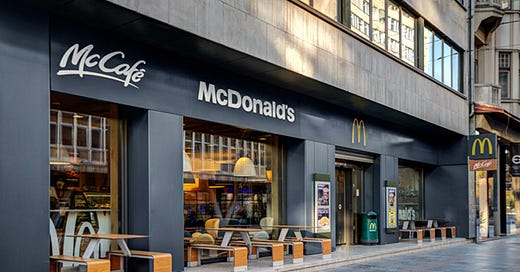Trip planning continues apace. Any restaurant recs on this route? -Katherine

Bentleys, Big Macs, and Bosnia
By Anja Jerkovic
This is a story of how McDonald’s arrived in, and then bailed on, our country.
On New Year’s Eve 2022, McDonald’s served its last customers at its five locations in Bosnia and Herzegovina and again became something more western, more American. In over a decade of operations, it never felt “ours” anyways: those golden arches always felt a bit foreign in the landscape, a tiny symbol of globalization in a region where we still smoke indoors and rely on mom and pop shops for most of our goods. And now McDonald’s, the world’s largest fast food franchise, could no longer count us amongst its 69 million customers worldwide.
The 95-year-old company from San Bernardino, California never really made any strong efforts to assimilate to our culture like it had in Greece, with the Big Mac with pita bread and tzatziki, or the prawn burger in Singapore. (Perhaps the meat patties were actually too familiar in our barbecue loving culture.) Nor were we gifted a McTrax recording studio, like they were in the Netherlands, or a McBoat float-through service like in Hamburg, Germany. No, the shock and unfamiliarity of a drive-through was enough for us in the Blue Heart of Europe, the Western Balkans.
I visited McDonald’s once. A friend from Norway came to visit for a longer span of time and in an effort to release my control of choosing everything we ate, I told her to pick our dinner spot before heading to the movie theater. “McDonald’s,” she replied. “They’re both in the mall.”
Why, when we lived in a country where it wasn’t weird to see a goat slow-roasting on a stick on any given day? Why, when our famous local dish, cevapi, was priced less than a Big Mac and just felt more like food? And what would Tito, our past Yugoslav-communist leader, say, he who sent our mothers and fathers over the border to Italy to buy Levis as a result of his emphasis on the local, the small, the Bosnian? I felt like throwing a paper bag over my head to meet her request. But my personal politics be damned, I went for some French fries, and nearly threw a fit when I was charged a quarter for a packet of ketchup. I was a part of the conventional outlook that didn’t quite see its place in our society
McDonald’s entered the Bosnian scene in 2011. Our capital city of Sarajevo received its first sit-in location, less than a mile away from where Franz Ferdinand was assassinated with his wife Sofia by Gavrilo Princip, igniting the start of World War One. Later, two other locations were opened in Sarajevo, and another two in Mostar. They were opened through franchise licensing by Gliese 581g, a company led by a man named Haris Ihtijarevic. One of our three presidents, the mayor of Sarajevo, and the minister of foreign affairs came to the first opening, so we can all say it was kind of a big deal. Look at us, we felt, that’s progress, the western kind.
Initially, headlines that followed the closing were focused solely on Ihtijarevic’s unpaid rent of around $537,000 for a location used by the company in Sarajevo. (Actually, McDonald’s is one of the world’s largest commercial real estate companies, with over 55% of their land and 70% of their buildings leased to franchisers. That means that in many cases, they own the land they operate on, and they’re profiting on the rent that comes in from that.) Ihtijarevic’s loaning bank, Raffeissen, was taking him to court in an effort to get the money. But it’s Bosnia we’re talking about here, a country where rules are suggestions and almost anything can be solved with money. This was not a big deal on its own.
Later, more information reached the surface: in particular, a Bentley Ihtijarevic bought himself as a company car because what else, in a country with a median salary of 350 euros a month, shall one franchise-owning man drive? And then there was the political corruption.
Ihtijarevic made a deal with Bosnian conservative nationalist political party SDA just ahead of Bosnia’s 2022 presidential elections wherein it could use McDonald’s billboard and placard space for political advertising. This was the big one — not for Bosnia, but McDonalds has some tight wording about not being used for political affiliation. Now the prime ad spots across the country, once reserved for McDonald’s food porn, were full of campaign slogans. How many votes went to SDA by Big Mac lovers, we’ll never know. McDonald’s never directly addressed the incident, but the restaurants were closed shortly thereafter. And the corporation is suing Ihtijarevic in commercial court in London.
What does it mean to have a country without McDonald’s? Is it a win in the grand scheme of things, in the wish for less commercialization, more family-owned shops? Or is it a loss for our economy, a loss of the things we share as world citizens? Or can it be both?
For the average Bosnian, I think it’s more like the parody this guy did on our country’s online marketplace by sarcastically selling the last burger for a little over $1,100. That’s Bosnian humor, the type that finds no pain in laughing at ourselves and our general lack compared to the west, plus our indoor smoking and EU membership-applying. It’s just silly, and it’s just so us to fuck up so badly that even McDonald’s, which just reopened its store in war-stricken Ukraine, said nah, we’re outta here.
I’m a little proud.
If you liked the newsletter today, please forward it to someone who’d enjoy it, and tap the heart icon above or below, which will help me reach more readers. I appreciate your help, y’all!
This newsletter is edited by Katherine Spiers, host of the podcast Smart Mouth.
A TableCakes Production.




